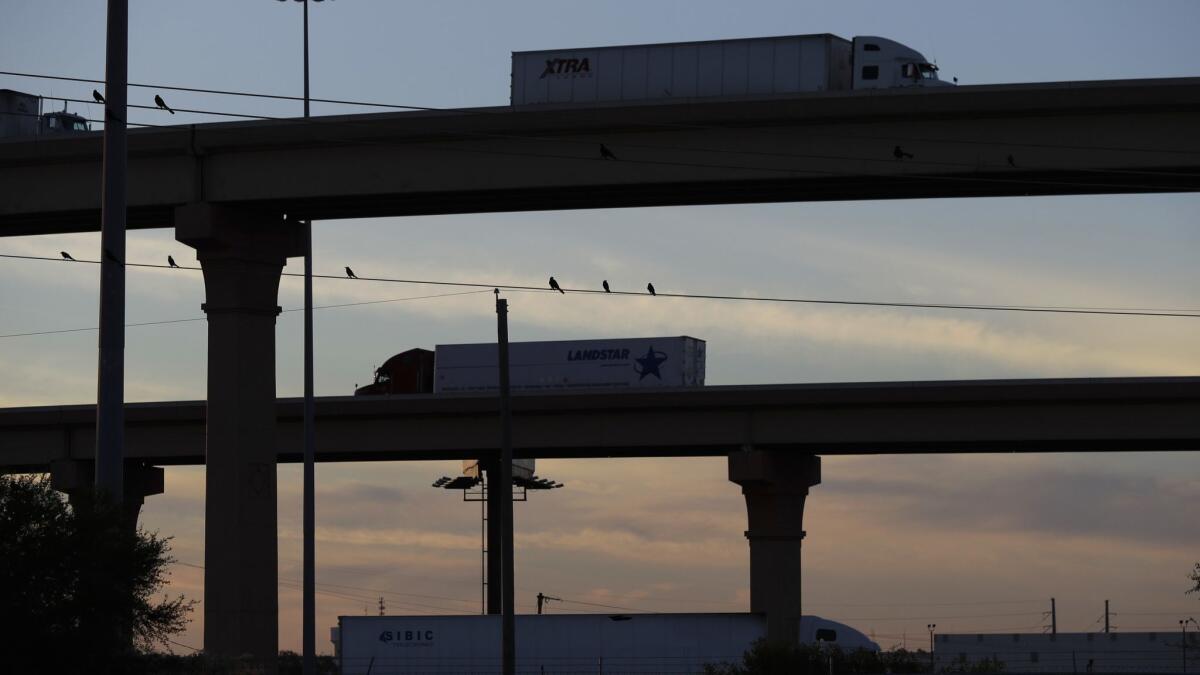Even after Trump pulled his tariff threat, trade pain is real in Laredo

- Share via
The turmoil in Laredo, Texas, started soon after President Trump’s threat to put tariffs on Mexican goods. It hasn’t let up since — even after he backed down.
“It’s a logistics nightmare,” said Jose Gonzalez, a customs broker in the border town that just this year became the largest U.S. port of entry. He’s hired by companies to ensure goods cross the border in top shape, and he would pay any tariffs up front.
Last week, Gonzalez fielded dozens of calls from factories and made arrangements to handle orders that were quickly doubled to beat upcoming levies. After Trump lifted his threat Friday night, companies frantically messaged again to resume their regular delivery pace. This week, he was still dealing with a crunch of resources and space, finding that for every truck in Laredo, there were about two loads that needed to be moved to their final destinations.
For this city of about 260,000 people, Trump’s eruptions on Mexico over the last 12 days set in motion changes that can’t be easily undone. The town is defined by trade between the two countries, with its industrial parks housing hundreds of freight and truck-rental companies, warehouses, gas stations and operators that lubricate daily commerce. Although the immediate tensions have eased, workers still face uncertainty about what comes next from a president who can change policy with a single tweet.
“It’s like a wrestling match: You have someone’s foot to your throat and you can breathe — but only just enough,” Gonzalez said. “The border is the lifeline of our industry.”
The effects of Trump’s threat are already being felt, tariffs or no. At the World Trade and Colombia Solidarity bridges, which carry about 12,000 trucks across the border each day, wait time Monday was still higher than usual because of the increased orders to beat the tariffs.
Ernesto Gaytan, general manager and co-owner of trucker Super Transport International Ltd., said his company was running at full capacity last week. His entire fleet of about 500 vehicles was on the road moving goods across the border. One client quadrupled orders to save $18 million in potential tariff costs.
Storage spaces that filled up quickly last week to accommodate the influx were still packed because there weren’t enough drivers, which meant Gaytan had to turn some clients away.
“We’re still beyond full capacity,” Gaytan said Monday. “Everything gets impacted by the tariffs if they ever go in. Everything goes through Laredo. Everybody’s going to feel the effects of it.”
Texas, which accounts for more than a third of U.S. trade with Mexico, would be hardest hit by any tariffs on Mexico. About 117,000 Texas workers would lose their jobs if the full tariff went into effect, according to the Perryman Group. The state is second only to California in labor-market reliance on Mexican trade, data from the Wilson Center show. And 5.9% of the gross domestic product is based on Mexican imports, second only to auto giant Michigan.
When we’re taxing things at the border, we’re actually taxing U.S. goods.
— Katheryn Russ, UC Davis
More than a third of U.S. imports from Mexico actually originated in America, with some items crossing the border multiple times. It underscores just how interconnected and complex the trading relationship is between the countries, and makes it hard to quantify just how hard Americans would be hit by the levies.
“When we’re taxing things at the border, we’re actually taxing U.S. goods,” said Katheryn Russ, an associate economics professor at UC Davis. “Consumers may not notice, but it will filter down.”
Fruits and vegetables are among the top traded commodities and the most time sensitive. Rodolfo Delgado, who owns a 35,000-square-foot refrigerated warehouse in Laredo’s north end, said his clients were worried that delays at the border could hurt their produce.
“Importing fruits and vegetables, it’s like importing a trailer of dynamite with a wick on it,” Delgado said. “You cannot hold it; you just have to send it to the final destination to be sold.”
Some of his clients were resigned last week to absorbing the 5% tariff hit, while others were opting to freeze their goods or looking at selling to Canada instead of the U.S., he said.
“There are many other countries in the world that will buy and sell to Mexico,” Delgado said Monday. “What we’ve got is the threat from Trump that’s still looming on us, and people are really getting tired of it.”
With a final U.S.-Mexico trade deal still to be worked out, there’s more unease hanging over the region.
“It’s just one thing after another here,” said Miguel Conchas, president of the Laredo Chamber of Commerce. “It’s the uncertainty that really plays havoc with business people here in town and in Mexico.”
Dmitrieva writes for Bloomberg.
More to Read
Inside the business of entertainment
The Wide Shot brings you news, analysis and insights on everything from streaming wars to production — and what it all means for the future.
You may occasionally receive promotional content from the Los Angeles Times.










